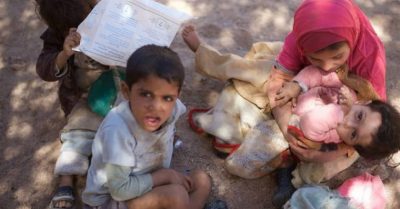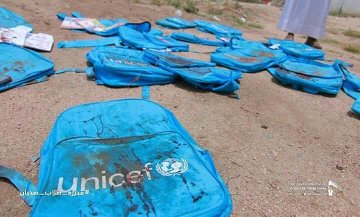
Note to readers: please click the share buttons above
It must have been a moment of unspeakable shock, terror and pain. But it’s hard to know exactly what it was like at the moment last Thursday when a school bus packed with Yemeni schoolchildren — summer campers coming back from a picnic — was struck from the skies by a powerful bomb, because so few of these innocent kids survived to tell about it, and because those who did are mostly clinging to life, maimed or badly burned by the blast.
Instead, we can only gape at pictures of a twisted metal frame that hardly resembles the bus that was once filled with happy, singing children, or watch the widely circulated video of the aftermath of what happened in the market district of Saada in northern Yemen, in which a distraught, failing man raises the blue tarp of a pickup truck to reveal a tangle of young bodies as he lifts up the limp arm of one of the dead schoolkids.
At least 29 people — according to the International Committee of the Red Cross — and quite possibly 40 or 50, according to Yemeni estimates, were killed in the airstrike by jets in the Saudi-led coalition that’s been waging a brutal war against the Saudis’ next-door neighbor on the Arabian Peninsula for the last four years.
A spokesman for the Saudi coalition called it “a legitimate military operation” in its campaign against Houthi rebels that operate in northern Yemen — a claim that was scoffed at by most of the rest of the world, alarmed at the growing humanitarian crisis in the region.
“Does the world really need more innocent children’s lives to stop the cruel war on children in Yemen?” asked Geert Cappalaere, the regional director for the Middle East and Northern Africa of the aid group UNICEF. Many of the kids killed or wounded in the attack were carrying bright blue UNICEF school bags, now shredded and burned.
The merciless Saudi-led war in Yemen — which has not only claimed 13,500 lives but triggered a humanitarian crisis in which some 20 million Yemenis, out of a nation of just 29 million, are scrambling for food and other basic necessities and as many as 900,000 people are suffering from cholera — is what it is today because of help from the United States.
America offers the Saudis and its allies in the region the intelligence used to carry out the nonstop airstrikes and other military operations. The planes that conduct the bombing runs are refueled by American forces in the region. And many of the bombs that have been dropped on Yemen — including those that have struck hospitals and other civilian targets — were manufactured and supplied by the United States.
*
Featured image is from Julien Harneis / Flickr.
The original source of this article is Philly.com
Copyright © Will Bunch, Philly.com, 2018
















